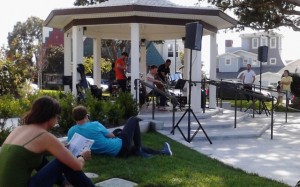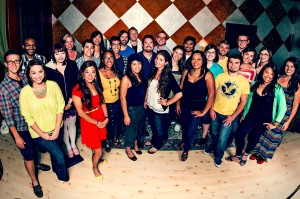Carlsbad Music Festival’s Magic

While a rallying cry of “the cutting edge artistic innovation” is generally received as a warning to traditionally-minded music audiences, the Carlsbad Music Festival has managed to make this premise surprisingly audience friendly. A pair of festival concerts on Saturday (Sept. 22) afternoon—Andy Akiho and Friends and the choral ensemble Sacra/Profana—demonstrated how this festival makes the avant garde accessible.
Following Timothy Andres’ impressive solo piano recital at the Carlsbad Village Theatre (which I reviewed separately on SanDiegoStory.com), the audience members strolled a few blocks through old Carlsbad to Magee Park, where composer and virtuoso steel pannist Andy Akiho and his ensemble gave a free concert in the park’s gazebo.
Although the singing, percussive sound of the steel pan (often called in the vernacular “steel drum”) is immediately associated with Carribean folk and popular music, Akiho has brought his instrument into more “serious” musical modes, including contemporary jazz. Ably assisted by percussionist James Yoshizawa and electric bassist Samuel Carl Adams, Akiho created sonic fantasies that balanced an immediate lyrical appeal with sophisticated rhythmic and contrapuntal complexity.
The festival program biography notes that Akiho is a doctoral fellow in composition at Princeton, and although the shy performer did not explicitly claim authorship of the various works in the group’s hour-long set (announced from the stage but not printed in the program book), I believe we were meant to assume that they were all his own. His idiom, unabashedly melodic and essentially tonal with occasional pentatonic mood swings, would not sound out of place in a hip jazz club, and on a late summer afternoon in the park, it was as welcome as the gentle breeze that mitigated the unusually muggy weather. Akiho’s skilled execution of complex patterns on his “simple” popular instrument would easily challenge, say, the most adept marimba player.
In the most probing etude of the set, the trio was joined by Calder Quartet cellist Eric Byers, whose clean, lyrical line not only integrated well into the ensemble, but his easy legato fused the other timbres into a more cohesive sonority.

Sacra/Profana Choral Ensemble (courtesy of the performers)
From Magee Park I followed the festival pilgrims to St. Michael’s By-the-Sea Church, where Krishan Oberoi’s ensemble Sacra/Profana offered its program of contemporary choral works. As a prelude to Brazilian composer Ernani Aguiar’s electric, ecstatic “Salmo 150,” the men of Sacra/Profana intoned a simple Gregorian chant setting of Pslam 150. Their cool, slightly austere timbre contrasted well with the bright, buoyant color Oberoi demanded for Aguiar’s flashy 1993 version of the final Psalm of Hebrew Scripture.
Minnesota composer Joshua Shank’s recent “A Green-Grass Pillow” at first gave the impression of couplets of naïve folk poetry reiterated with the fervor of a Pentecostal revival; then it suddenly settled into a slowly moving, densely-voiced chorale that reminded me of Stephen Paulus’ choral style, another Minnesota composer.
Stephen Feigenbaum’s “Fog Dream,” written last year, was structured more like a pop song, with the choir providing a pulsing, hummed accompaniment of tightly-voiced harmonic clusters supporting vocalist Kelsey Young’s solo narrative of a child being mysteriously lured into the fog by a deer. More opaque was David Lang’s “I Lie,” an aphoristic essay for treble voices of an odd Yiddish folk poem, although it gave us a chance to hear the radiant soprano Angelica Eclar in an ardent solo.
New York composer/impressario Michael Gordon, one of the festival’s composers-in-residence, was represented by his 2008 “He Saw A Skull,” a complex progression of rhythmic hockets surfing on unpredictable and at times breathtaking harmonic waves. His text, a parable by the esteemed Rabbi Hillel, needed a panel of Talmudic scholars to unearth its meaning, but Gordon’s choral sonority evoked oracular spirituality.
Most challenging to the singers and rewarding to the audience was György Ligeti’s “Lux Aeterna,” made famous by its inclusion in the sound track of Stanley Kubrick’s “2001.” With its jarring, kaleidoscopic harmonic shifts and shimmering walls of brilliant color, this 1966 piece was more radical and sonically searing than any of the recent pieces on the Sacra/Profana program. And although this performance was completely acoustic, Oberoi’s vocalists managed to produce austere, electronic sounds in a most uncanny simulation.
Oberoi devoted a portion of his concert to participation by the San Diego Children’s Choir, which joined his singers in Mendelssohn’s familiar “Life Thine Eyes” and Benjamin Britten’s little-known setting of “Heaven-Haven,” a poem by Gerard Manley Hopkins.
I have heard Sacra/Profana give more polished performance of contemporary music, but I laud their bravery and musical conviction in giving life to such demanding and compelling works.

Ken Herman, a classically trained pianist and organist, has covered music for the San Diego Union, the Los Angeles Times’ San Diego Edition, and for sandiego.com. He has won numerous awards, including first place for Live Performance and Opera Reviews in the 2017, the 2018, and the 2019 Excellence in Journalism Awards competition held by the San Diego Press Club. A Chicago native, he came to San Diego to pursue a graduate degree and stayed.Read more…
